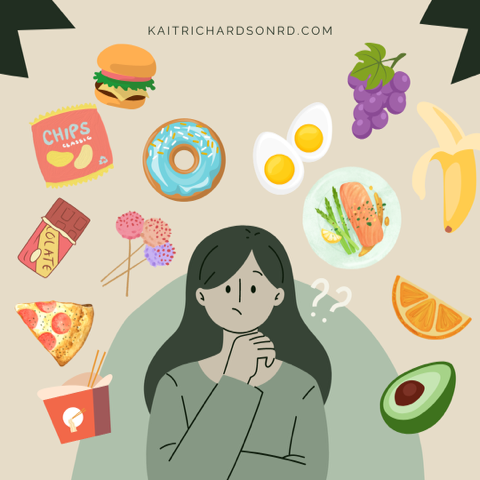The Secret to Stop Binge Eating

What if I told you the secret to stop binge eating was to eat more?
Binge eaters, picture this: you start your work day off committed to eating 1300 calories. For breakfast, you choke down bland egg whites and a chalky protein shake. By the time it’s 10 am, your tummy grumbles. Rather than eating, you suppress your hunger with black coffee until noon.
In your lunch box is a green salad with two-day old chicken, a low-fat vinaigrette, and exactly ⅛ cup of shredded carrots. Begrudgingly, you stab your fork into the bowl of leaves while your colleague enjoys a thick, overstuffed hummus wrap. You salivate as you watch chunks of feta tumble out from the tortilla and obsess whether or not cheese would be OK to add to your salad.
After returning to your desk unsatisfied, you remember the granola bar stashed in your desk drawer. Feeling guilty about the 11 grams of added sugar, you devour it while swearing you’ll skip carbs at dinner.
Just one problem: you’re still hungry. The rest of your afternoon is clouded by thoughts of food, making it hard to concentrate on work. Your body and brain are begging for nourishment but your calorie counting app says no. You feel bad for wanting food.
But by the time you get home, it’s game over. At a long stoplight, you caved and ordered an XL pizza off UberEats. But even the 12 minute arrival time does not stop you from tearing into your pantry like a grizzly bear at an abandoned campsite. You munch on trail mix, a handful of stale crackers, and even some chocolate chips you hid from yourself in the back of the freezer. At this point, there’s no point in counting calories- the day is ruined by your binge. Your stomach is uncomfortably full, and you feel an overwhelming sense of guilt and shame. Tomorrow, you say to yourself, I will do better.
The thing is, tomorrow won’t be better if you continue to restrict food to unhealthy levels. This is because the body’s normal and healthy response to starvation is to seek out large amounts of quick energy in the form of sugar, fat, and ultra-processed foods. Why? To keep you alive! Read How to Eat like a Normal Person to understand the binge-eating pattern.
Unless you have anorexia nervosa, an extreme eating disorder with the highest death rate of all mental health disorders, your body will drive you to seek out food when it is not getting enough nutrition. This explains why women who struggle with the all-or-nothing mentality with food often ping-pong between diets and binging- their bodies are recovering from mild starvation by overeating.
In fact, studies show adopting a regular eating pattern has been shown to reduce the frequency of binge eating while suppressing hunger can increase the occurrence of binge eating. This means to stop binge eating, you must fuel your body throughout the day with the right balance of protein, complex carbs, and dietary fats.
Feel confused or overwhelmed by the idea of eating more to binge less? How to Eat Like A Normal Person: Guide to Overcoming the “All-or-Nothing” Mindset with Food & Diet is a story-workbook that will teach you how to eat for YOUR body so you stop binge eating and heal your relationship to food.
Written by Kait Richardson, Registered Dietitian Nutritionist and author of How to Eat Like A Normal Person: Guide to Overcoming the “All-or-Nothing” Mindset with Food & Diet. You can follow her on Instagram @kaitrichardsonrd.
Pre-order your copy here.

